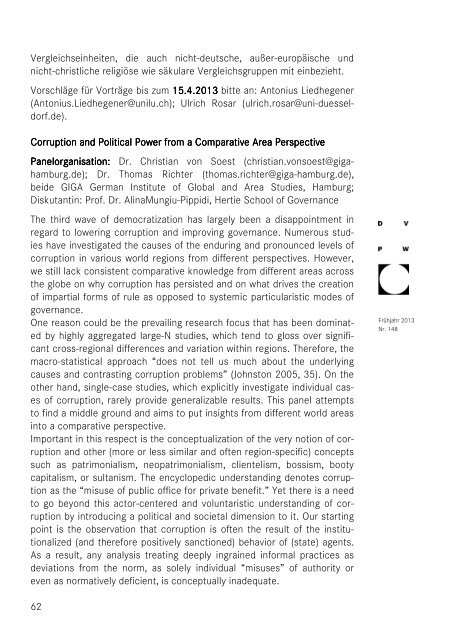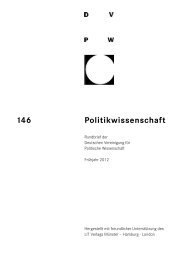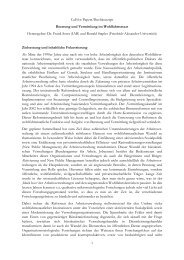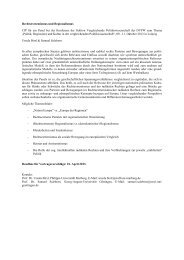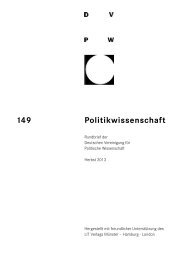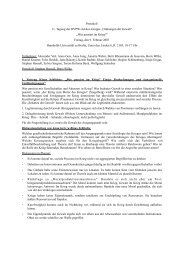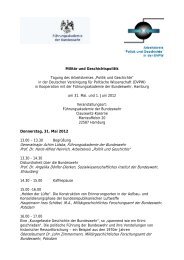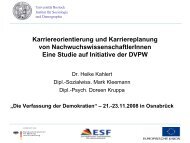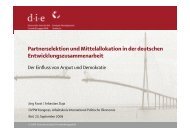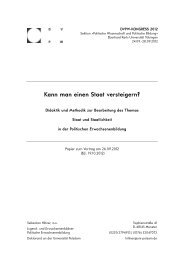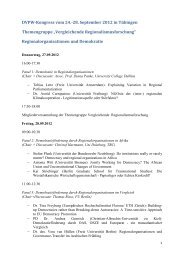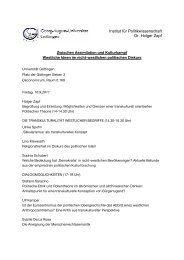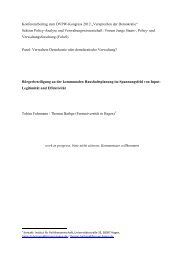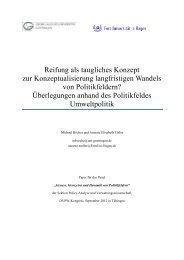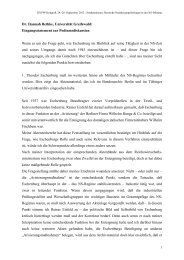Politikwissenschaft 148 - DVPW
Politikwissenschaft 148 - DVPW
Politikwissenschaft 148 - DVPW
Erfolgreiche ePaper selbst erstellen
Machen Sie aus Ihren PDF Publikationen ein blätterbares Flipbook mit unserer einzigartigen Google optimierten e-Paper Software.
Vergleichseinheiten, die auch nicht-deutsche, außer-europäische und<br />
nicht-christliche religiöse wie säkulare Vergleichsgruppen mit einbezieht.<br />
Vorschläge für Vorträge bis zum 15.4.2013 bitte an: Antonius Liedhegener<br />
(Antonius.Liedhegener@unilu.ch); Ulrich Rosar (ulrich.rosar@uni-duesseldorf.de).<br />
Corruption and Political Power from a Comparative Area Perspective<br />
Panelorganisation:<br />
n: Dr. Christian von Soest (christian.vonsoest@gigahamburg.de);<br />
Dr. Thomas Richter (thomas.richter@giga-hamburg.de),<br />
beide GIGA German Institute of Global and Area Studies, Hamburg;<br />
Diskutantin: Prof. Dr. AlinaMungiu-Pippidi, Hertie School of Governance<br />
The third wave of democratization has largely been a disappointment in<br />
regard to lowering corruption and improving governance. Numerous studies<br />
have investigated the causes of the enduring and pronounced levels of<br />
corruption in various world regions from different perspectives. However,<br />
we still lack consistent comparative knowledge from different areas across<br />
the globe on why corruption has persisted and on what drives the creation<br />
of impartial forms of rule as opposed to systemic particularistic modes of<br />
governance.<br />
One reason could be the prevailing research focus that has been dominated<br />
by highly aggregated large-N studies, which tend to gloss over significant<br />
cross-regional differences and variation within regions. Therefore, the<br />
macro-statistical approach “does not tell us much about the underlying<br />
causes and contrasting corruption problems” (Johnston 2005, 35). On the<br />
other hand, single-case studies, which explicitly investigate individual cases<br />
of corruption, rarely provide generalizable results. This panel attempts<br />
to find a middle ground and aims to put insights from different world areas<br />
into a comparative perspective.<br />
Important in this respect is the conceptualization of the very notion of corruption<br />
and other (more or less similar and often region-specific) concepts<br />
such as patrimonialism, neopatrimonialism, clientelism, bossism, booty<br />
capitalism, or sultanism. The encyclopedic understanding denotes corruption<br />
as the “misuse of public office for private benefit.” Yet there is a need<br />
to go beyond this actor-centered and voluntaristic understanding of corruption<br />
by introducing a political and societal dimension to it. Our starting<br />
point is the observation that corruption is often the result of the institutionalized<br />
(and therefore positively sanctioned) behavior of (state) agents.<br />
As a result, any analysis treating deeply ingrained informal practices as<br />
deviations from the norm, as solely individual “misuses” of authority or<br />
even as normatively deficient, is conceptually inadequate.<br />
Frühjahr 2013<br />
Nr. <strong>148</strong><br />
62


